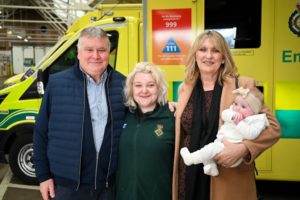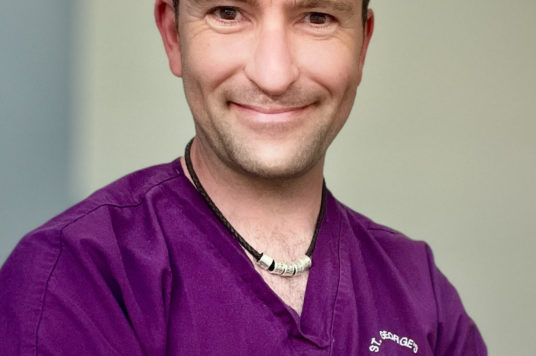‘Incredible’ medics ‘gift another life’ to patient after two cardiac arrests
A St George’s patient who was ‘gifted another life’ after having two cardiac arrests has praised ‘incredible’ medics.
Sue Whitham, 62, was placed in a medically-induced coma for several weeks after being rushed to hospital in an ambulance.
She has now recovered and has thanked the team at St George’s and paramedics at London Ambulance Service.
Sue said: “The hospital medics at St George’s were incredible. I’ve been gifted another life.”

Sue and Sue Whitham with granddaughter Sienna and call handler Mattie Wright
The grandmother was at home with husband Julian when she suddenly went into cardiac arrest.
Julian dialled 999 and call handler Mattie Wright counted with him as he carried out chest compressions before the ambulance arrived at the scene and took over.
Once Sue was stabilised, she was blue-lighted to St George’s but had another cardiac arrest on the way.
On her arrival medics at the hospital’s heart centre inserted tiny tubes, called stents, into the blood vessels around her heart to allow the blood to keep flowing through.
Sue was placed in the medically-induced coma for several weeks so her body temperature would drop and allow her to recover.
She woke to the news she had a new granddaughter, Sienna, to add to her four grandsons and vowed to get strong again so she could walk her in the park – which she can four months on.
Dr Jonathan Aron, Consultant in Intensive Care Medicine at St George’s Hospital, said: “It’s wonderful to hear that Sue has continued to do so well since leaving our care, and it was a privilege to have played such a vital part in her treatment and recovery.
“Patients who have suffered heart attacks and acute heart failure like Sue need immediate attention. This was an incredible response from everyone – from Sue’s family, to the call handler and paramedics, to the multiple teams of staff at St George’s and beyond.”
Sam Wilcox, Community Defibrillation Manager at London Ambulance Service, said “Knowing what to do when someone is in cardiac arrest and having the confidence to act quickly will save lives.
“The first few minutes before an ambulance arrives can make all the difference. Over 75 percent of cardiac arrests happen at home, so by learning these simple skills, you could save someone you love.”


